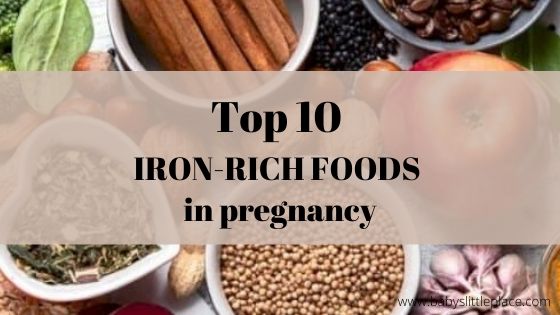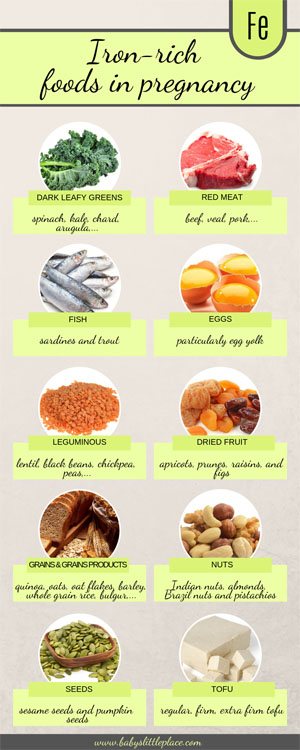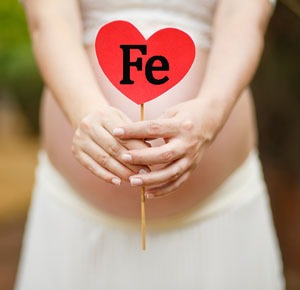
Top 10 iron-rich foods in pregnancy
Iron-containing foods are an important part of the pregnancy diet. Iron deficiency can lead to complications during pregnancy and impact the unborn baby as well. For all pregnant women, and especially for those with iron deficiency, is important to intake a balanced diet, which includes iron-rich foods on a daily basis.
We hope that our list of the top 10 iron-rich foods in pregnancy will help you in the preparation of healthy, iron-rich meals. Although maintaining a healthy level of iron is really important, iron deficiency is still the most common lack of nutrients in the world.
And I am not talking just about pregnant women, as this applies to us all. Minerals are indispensable for many body functions: blood formation and oxygen transfer, bone and tooth formation, the sensitivity of muscles and nerves, hormone formation, water regulation, and more.
Among them are the so-called macro-elements: potassium, sodium, magnesium, calcium, phosphorus, and chlorine, and microelements: iron, copper, zinc, chromium, selenium, nickel, manganese, molybdenum,…
RELATED: Micronutrient needs in pregnancy
Iron-rich foods in pregnancy
- dark leafy greens
- read meat
- fish
- eggs
- leguminous
- dried fruits
- grains and grain products
- nuts
- seeds
- tofu

Iron-rich foods can be very helpful in preventing mild anemia. It is a better solution as iron supplements because iron is absorbed better than from tablets and other supplements. In particular, animal products, such as red meat, eggs, and fish, contain a lot of iron. Therefore, vegetarians are slightly more at risk. But, a great source of iron are also whole grains, dark green vegetables (spinach, kale and Brussels sprouts), and legumes. So, if you are a vegetarian, you have other options too.
The best iron-rich food for pregnant women
and its added nutritional value
| FOOD GROUP | MOST IRON | ADDITIONAL NUTRIENT VALUE |
| DARK LEAFY GREENS | spinach, kale, chard, arugula,… | it is also loaded with vitamins A, C, K, and folic acid |
| RED MEAT | beef, veal, pork | creatine, minerals such as zinc and phosphorus, and B-vitamins |
| FISH | sardines and trout | incredibly rich in omega 3 fats |
| EGGS | particularly egg yolk | eggs are a good source of vitamins A, D and E, folate, and zinc |
| LEGUMINOUS | lentil, black beans, chickpea, peas | a significant source of protein, dietary fiber, carbohydrates, and other dietary minerals |
| DRIED FRUIT | apricots, prunes, raisins, and figs | vitamins C and K |
| GRAINS & GRAIN PRODUCTS | quinoa, oats, oat flakes, barley, whole grain rice, bulgur,… | good sources of magnesium, selenium, folic acid, niacin, and other B vitamins |
| NUTS | Indian nuts, almonds, Brazil nuts and pistachios | great source of magnesium and vitamin E |
| SEEDS | sesame seeds and pumpkin seeds | great source of copper, magnesium, zinc, phosphor, selenium and vitamin B1 |
| TOFU | regular, firm, extra firm tofu | an excellent source of amino acids, calcium, and other micronutrients |
Importance of iron in pregnancy
Hemoglobin is part of the red blood cells which are responsible for carrying oxygen throughout your body. Because the amount of women’s blood in pregnancy increases by as much as 40-50%, is the need for the synthesis of hemoglobin also higher.
If the concentration of hemoglobin falls, anemia occurs. Mild iron-deficiency anemia is common in pregnancy, and it shouldn’t cause problems to you or your baby. Most experts agree that the problems occur if anemia in pregnancy is more severe, undiagnosed, and left untreated.
Iron is not important just for you, but for your baby as well. If your hemoglobin concentration falls too low, the oxygen supply to the baby is too weak.
Because of that doctors monitor the iron levels in the blood throughout the whole pregnancy. The recommended daily intake of iron for adult women is 14 mg per day. Just as an example – you enter such an amount of iron into the body if you eat a cup of cooked spinach, 30 g of oat flakes, one egg (68 g), or veal steak during the day. But in pregnancy, the need is doubled, up to 28 mg per day.
Why you need more iron during pregnancy? Because you need it to support additional red blood cells, the placenta, and your growing baby. Of course, the extra iron prepares your body for any blood loss that may occur during birth too.

Iron deficiency in pregnancy
Iron deficiency, especially during pregnancy, disturbs thermoregulation and can have a negative impact on physical performance. It can also lead to premature birth. Research has shown that pregnant women with iron deficiency give premature birth more often than women without these issues. The lack of iron slows down the baby’s growth and the probability of being born with low birth weight greatly increases. Those children often suffer from reduced body capacity, poor immune function, and learning disorders. Therefore, it is necessary to determine if a pregnant woman suffers from iron deficiency, and take appropriate action as soon as possible.
Iron deficiency symptoms in women are:
- fatigue
- exhaustion
- you get tired quickly
- shortness of breath
- increased hair loss
- pale skin
- dizziness
- headaches
- restless legs syndrome
Iron levels depend on other nutrients
Besides the intake of iron-rich foods, there are other factors that impact the level of this microelement in your blood.
Food, which increases iron absorption:
- foods rich in vitamin C, B12, and B9 will help with iron absorption
- nuts and berries increase iron metabolism
- minerals such as phosphorus, copper, and calcium also help in better absorption of iron in the blood
Food absorption is greatly decreased if you are consuming too many foods that contain ‘iron blockers’.
Iron blockers:
- if you want to maintain the correct level of iron, avoid larger amounts of coffee or black tea
- milk (A glass of milk reduces absorption by half!)
- soy products also prevent the proper iron absorption
- certain spices, especially oregano
- excessive intake of fiber-rich foods
- tomatoes
Of course, you can eat them during pregnancy, just in a moderate amount. It is also best to consume them separate from iron-rich foods. To avoid lower absorption eat them at least two hours before or after iron-rich foods.
Other factors that can lead to iron deficiency during pregnancy:
- diet low in iron-rich foods
- pregnant women under 20 years of age are more at risk
- the short gap between pregnancies
Iron supplements during pregnancy
For pregnant women who have anemia, just iron-rich foods won’t be enough. If you have anemia, iron supplements are very important for you. Talk with your provider about taking them. Iron supplements should be selected according to the iron levels in the blood, and its content in a certain supplement. Studies had shown if pregnant women with normal iron levels taking iron supplements as a precaution, it doesn’t have any noticeable health benefits for them or for their baby. If you have normal iron levels in your blood, you don’t need the supplements. You can get enough iron in your diet.
